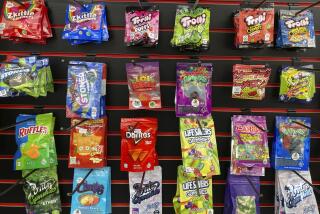Amid marijuana safety concerns, Colorado unveils pot vending machines
LITTLETON, Colo. — In the posh resorts of Vail Valley, where celebrities are as common as the paparazzi who stalk them, a machine has suddenly stolen the limelight.
Meet Zazzz, thought to be the nation’s first identity-verifying marijuana vending machine. Unveiled at an invitation-only party in Avon, Colo., last weekend, it has become another first in a state that has seen its share since recreational marijuana was legalized.
At first glance the lime green contraption looks like any that might spit out soft drinks or Cheetos, only this one comes equipped with state-of-the-art technology to check a user’s identity and can dispense a full array of marijuana products, including edibles and pre-rolled joints.
But even as this quirky sensation was making its debut, in other parts of the state Colorado continued to grapple with growing concern over the danger associated with misguided marijuana use and the ease with which products were falling into underage or unsuspecting hands.
On Monday night, a 44-year-old Denver wife and mother was shot and killed as she pleaded on the phone with police dispatchers to send help. She said her husband was becoming increasingly violent, suffering from hallucinations and may have consumed edible marijuana, police said.
Denver police spokesman Sonny Jackson confirmed to the Los Angeles Times on Tuesday that Richard Kirk’s possible pot use was part of the homicide investigation.
Kristine Kirk’s death comes one month after a Wyoming college student jumped to his death from a Denver hotel balcony after eating an unknown amount of a marijuana cookie. On April 2, the Denver coroner’s office ruled that marijuana use was linked to his death.
“This is all happening so quickly we can’t keep up with it,” said Rep. Frank McNulty, a Republican lawmaker in Colorado’s General Assembly. He said Wednesday that in testimony in committee, as well as in media reports, there have been almost daily incidents of children ingesting marijuana resembling candy or cookies, with some kids ending up in the hospital.
McNulty and Democratic Rep. Jonathan Singer of Boulder have joined together to back a bill to standardize the potency so that one ounce of a marijuana leaf product is the same as an edible or other type. The lawmakers are also pushing a measure that would require that any candy that contained marijuana be distinguishable from normal candies, either in shape, color or size.
Edibles have recently come under intense scrutiny following the Wyoming student’s death, considered by authorities to be the first marijuana-related death since recreational use was legalized.
By law, such products can contain no more than 10 milligrams of THC per serving, but often consumers don’t pay attention to serving sizes. One large brownie can contain up to 10 servings, or 100 milligrams of THC, the active ingredient in marijuana.
Dr. Paula Riggs, a psychology professor and director of the division of substance dependence at the University of Colorado-Denver, says smoking marijuana hits the central nervous system quickly. But edible marijuana has a delayed reaction, so people often keep eating, looking for a buzz.
“A half-hour later they are on their back,” she told The Times this month.
Avon Police Chief Bob Ticer, who serves as president of the Colorado Assn. of Chiefs of Police, said he and other law enforcement officials were watching the vending machine rollout along with all of the other firsts in the state. “We would want to make sure the state regulates them just as strongly as they do any other dispensary,” he said, adding that he wants assurances systems are in place in the machines so no one under 21 can use them.
He finds irony that the celebration to introduce Zazzz occurred in his little town, where neither medical nor recreational marijuana is legal. The law Colorado passed allows towns and cities to keep marijuana illegal if they choose.
Ticer said one of his first orders of business was to make sure the vending machine was empty.
McNulty, who represents the Denver suburb of Highlands Ranch, said Wednesday he was hopeful that the new machines, with their enhanced identity verification, could actually help combat underage use.
“As long as they stay in medical or retail establishments, it’s probably OK. But as soon as they start moving outside, that’s when the danger begins,” he said, recalling a time when minors easily could buy cigarettes from vending machines when no one was watching.
“That was 20th century stuff,” countered Stephen Shearin, chief operating officer for Tranzbyte, the Tempe, Ariz., technology company that developed the vending machine through its American Green division. “This is 21st century.”
He said the first Zazzz machine would be located inside a medical marijuana dispensary in Eagle County near Vail. Consumers will have to give proof of age and identity to enter the store, and the vending machine’s technology will offer a second layer of protection.
It is expected to be up and running in a few weeks once regulations are finalized. Shearin said there were already two pending orders for additional machines — one in Colorado and one in an undisclosed location on the East Coast — with a lot of interest pouring in for others. He said his company could make up to 17 per week.
Users can buy their product of choice out of the vending machine with cash, Bitcoin or a special Zazzz card. Traditional credit cards cannot be accepted because of banking and commerce laws. Under federal law, the purchase of marijuana is still prohibited.
Shearin said he was well aware of the controversies surrounding marijuana use that are surfacing in the state and wants to work with law enforcement to make sure his product is not abused.
“I’ve got a 12-year-old daughter,” he said. “I’m very respectful of all of the issues.”
Times staff writer Paresh Dave in Los Angeles contributed to this report.
More to Read
Start your day right
Sign up for Essential California for news, features and recommendations from the L.A. Times and beyond in your inbox six days a week.
You may occasionally receive promotional content from the Los Angeles Times.






